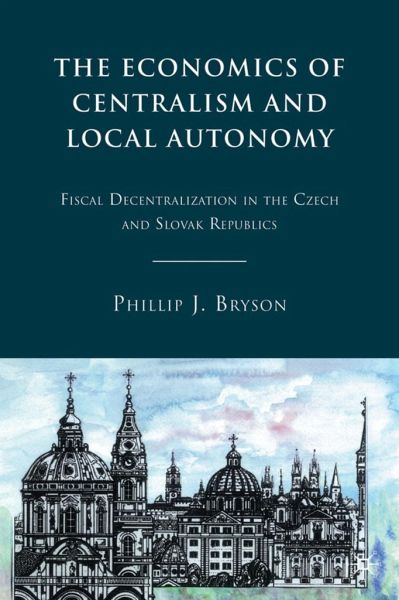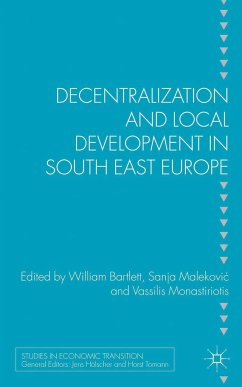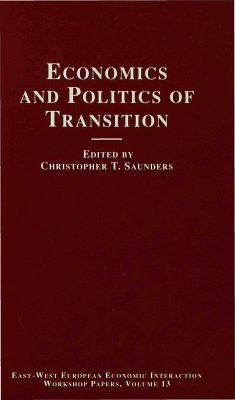
Phillip J. Bryson
Gebundenes Buch
The Economics of Centralism and Local Autonomy
Fiscal Decentralization in the Czech and Slovak Republics
Versandkostenfrei!
Versandfertig in 6-10 Tagen

PAYBACK Punkte
38 °P sammeln!





A comparative analysis of the process of public sector transition from central planning to market democracy. It is the story of the difficulties and complexities of moving to a system of greater autonomy for the subnational governments of the Czech and Slovak Republics, including the future of fiscal policies after the global recession.
PHILLIP J. BRYSON is the Douglas and Effie Driggs Professor of Economics at the Marriott School, Brigham Young University, USA.
Produktdetails
- Verlag: Palgrave Macmillan / Palgrave Macmillan US / Springer Palgrave Macmillan
- Artikelnr. des Verlages: 978-0-230-10429-7
- 2010 edition
- Seitenzahl: 292
- Erscheinungstermin: 18. Oktober 2010
- Englisch
- Abmessung: 211mm x 140mm x 20mm
- Gewicht: 500g
- ISBN-13: 9780230104297
- ISBN-10: 0230104290
- Artikelnr.: 29738412
Herstellerkennzeichnung
Libri GmbH
Europaallee 1
36244 Bad Hersfeld
gpsr@libri.de
"One of the challenges facing transitional countries has been how to finance the often small and non-viable local self-governments that were often created in the early years. The discussion in this book of the divergent paths that have been taken with respect to fiscal decentralization by the Czech and Slovak Republics since they separated in 1993 casts considerable light on this issue. More broadly, the book should be of interest not only to those attempting to analyze and understand the development of the public sector in transitional countries but also to anyone concerned about the real meaning of local autonomy in any country." - Richard M. Bird, Professor Emeritus, Rotman School of Management, University of Toronto
"This book
"This book
Mehr anzeigen
makes valuable contributions to comparative economics, to the understanding of regional decentralization of government functions and to our understanding of the process of transition in Central Europe. Bryson s description and analysis of the difficult process of empowering local governments to seek out tax revenues and to provide public services focuses attention on a key, but often neglected, aspect of transition from the communist centralized economy to one with multiple layers of government and of a measure of local autonomy for citizens. The comparison of this process in two countries, the Czech and Slovak Republics is an interesting exercise in comparative economics: both countries started with virtually identical government structures but each faced a different set of problems after the dissolution of Czechoslovakia. Moreover, fiscal decentralization played an important role in shaping democracy and in preparing the countries for EU accession. The field research and case studies on which parts of the book are based bring a sense of immediacy to the analysis, which should be of interest to a broad range of readers." - Josef. C. Brada, Professor of Economics, Arizona State University
"It has been two decades since Central and Eastern European countries started on one of the largest social experiments in history. In this book Philip Bryson offers a vivid and insightful account of the largely successful transition from planned socialism of the Czech and Slovak republics to fiscally decentralized and democratic systems." - Jorge Martinez-Vazquez, Regents Professor of Economics, Andrew Young School, Georgia State University
"It has been two decades since Central and Eastern European countries started on one of the largest social experiments in history. In this book Philip Bryson offers a vivid and insightful account of the largely successful transition from planned socialism of the Czech and Slovak republics to fiscally decentralized and democratic systems." - Jorge Martinez-Vazquez, Regents Professor of Economics, Andrew Young School, Georgia State University
Schließen
Für dieses Produkt wurde noch keine Bewertung abgegeben. Wir würden uns sehr freuen, wenn du die erste Bewertung schreibst!
Eine Bewertung schreiben
Eine Bewertung schreiben
Andere Kunden interessierten sich für













